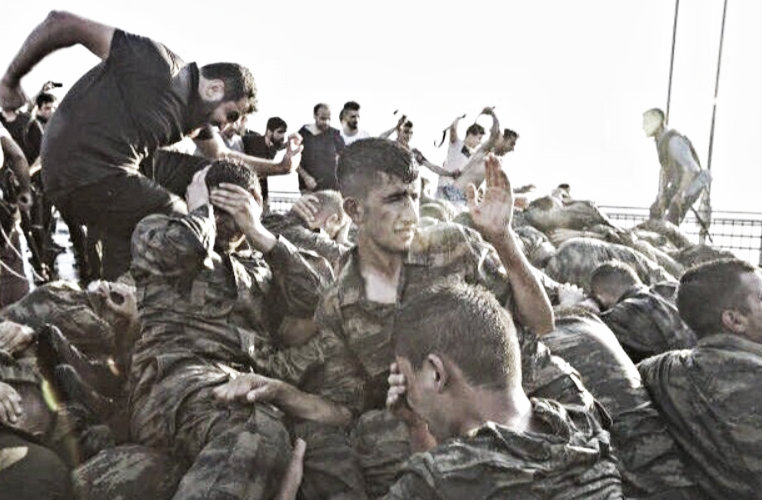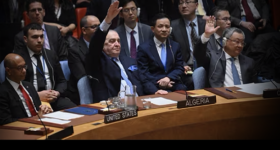
Military dissidents beaten by Erdogan AKP supporters. Bosphorous. Photo: Twitter
Sandyha Jain
PGurus
Early in the morning of July 16, as the world woke up to news of an ongoing coup d’état in Turkey, by a group that identified itself as “Peace in the Country Council,” it was soon clear that the government of President Recep Tayyip Erdoğan would beat back the attempted takeover, which lacked support of the top military brass. As early at 7 a.m. IST, it was clear the regime had carried the day.
The coup could to be the handiwork of anti-ISIS soldiers as the regime’s support to the ultra-radical Islamic State and its excessive violence against Kurdish rebels even while peace negotiations were going on with Abdullah Öcalan at Imrali Island, has been the subject of considerable resentment within the ranks of the military. Serving officers have at times spoken their mind on the subject, albeit on condition of anonymity.
However, the Turkish media’s sharp criticism of the Erdogan regime’s support to rebels fighting for regime change in Syria, including a daring (and embarrassing) expose of arms shipments for the rebels, couldn’t have been possible without military inputs. In retrospect, the coup was likely a response to military exasperation with Erdogan’s policies.
Erdoğan himself blamed the followers of US-based scholar Fethullah Gülen for the attempt. While this has yet to be confirmed, it is interesting that the Canada-based politician and Islamic scholar, Tahir-ul Qadri, who launched a futile “Pakistan Spring” against the Nawaz Sharif government in January 2013, has significant connections to Gülen. Both governments being targeted (Turkey, Pakistan) are popularly elected.
The coup failed because it was badly planned; possibly it lacked sufficient support to be effective. Neither the President, vacationing in the southern resort of Marmaris, or Prime Minister Binali Yıldırım, was arrested. Instead, despite the curbs placed by his own regime on the social media, Erdoğan managed to appeal to the people to resist the coup – they came out on the streets in large numbers, waving Turkish flags, and attacking police, soldiers, and the tanks that rolled out on the streets.
Erdogan managed to land his plane at Istanbul’s Atatürk airport – though tanks were stationed there – and claimed to be fully in charge. The regime survived as top military leaders backed it. Gen. Zekai Aksakalli, commander of the military special forces, took to television to condemn the action and order troops back to the barracks.
By the time the plotters reached and bombed Marmaris, Erdogan had departed. On landing, he said he did not know the whereabouts of Chief of General Staff Gen. Hulusi Akar. However, Turkish National Intelligence spokesperson Nuh Yilmaz informed CNN Turk that the coup attempt had been quashed and that Gen. Hulusi Akar was back in control. The coup began late Friday night with a bomb explosion at Parliament and other places in Ankara, air battles and gunfire across the capital. While the number of casualties is as yet unknown, 17 policemen were killed in an attack on Gölbaşı Special Forces Department headquarters besides two employees of the Turkish satellite operator TÜRKSTAT.
Observers blamed Erdogan’s increasingly authoritarian rule for the crisis, which saw the exit of former Prime Minister Davutoglu and extremely harsh treatment of dissidents, opposition leaders (taking away the parliamentary immunity of Kurd MPs) and opposition media (Turkey has the highest number of journalists in jail in the ‘free’ world).
The regime has come under international scrutiny for permitting the free flow of jihadis and weapons to rebel groups fighting the government in Syria (the ‘jihad highway’), which resulted in the rise of the brutal insurgent group, Islamic State, which is fast spreading its tentacles worldwide. The anti-Shia strategy of promoting regime change in Syria and cornering its Iranian ally through (Sunni) Islamic terror backfired when America forced Turkey to take an active role in the US-led coalition against the ISIS. A series of deadly bombings followed on Turkish soil, all attributed to ISIS.
Washington reacted with concern for its ally in the fight against terror. US Secretary of State John Kerry called Foreign Minister Mevlut Cavusoglu to express Washington’s “absolute support for Turkey’s democratically-elected, civilian government and democratic institutions.” NATO Secretary-General Jens Stoltenberg also spoke to Cavusoglu and called for respect for democracy.
The coup leaders issued a statement late Friday saying they had seized control “to reinstall the constitutional order, democracy, human rights and freedoms, to ensure that the rule of law once again reigns in the country, for law and order to be reinstated.” Those behind the coup can expect harsh justice, but there is no gainsaying that the regime is safe from another attempt in the future.
A major reason for failure is that coup plotters lacked the resources to grab all vantage points in the capital simultaneously. Turkey’s state-run news agency remained on air and announced that military helicopters had attacked the headquarters of TURKSAT satellite station on the outskirts of Ankara and the Ankara police headquarters. It said tanks were moving toward a palace used by Prime Minister Binali Yıldırım and deputy prime ministers. A car that tried to stop one of the tanks was rammed through but the occupants escaped.
***
Stay tuned for updates here at 21WIRE.
READ MORE TURKEY NEWS AT: 21st Century Wire Turkey Files
Support our work by Subscribing and Becoming a Member @21WIRE.TV















